Related Research Articles

The police are a constituted body of persons empowered by a state, with the aim to enforce the law, protect public order, and the public itself. This commonly includes ensuring the safety, health, and possessions of citizens, and to prevent crime and civil disorder. Their lawful powers encompass arrest and the use of force legitimized by the state via the monopoly on violence. The term is most commonly associated with the police forces of a sovereign state that are authorized to exercise the police power of that state within a defined legal or territorial area of responsibility. Police forces are often defined as being separate from the military and other organizations involved in the defense of the state against foreign aggressors; however, gendarmerie are military units charged with civil policing. Police forces are usually public sector services, funded through taxes.

The Metropolitan Police Service (MPS), also officially known as the Metropolitan Police, which is still its common name, serves as the territorial police force responsible for law enforcement and crime prevention within the ceremonial county of Greater London. In addition, it is responsible for specialised tasks throughout the United Kingdom, such as UK counter-terrorism measures, and the protection of certain individuals, including the monarch, royal family, governmental officials, and other designated figures. Commonly referred to as the Met, it is also referred to as Scotland Yard or the Yard, after the location of its original headquarters in Great Scotland Yard, Whitehall in the 19th century. Its present headquarters are near there at New Scotland Yard on the Victoria Embankment.
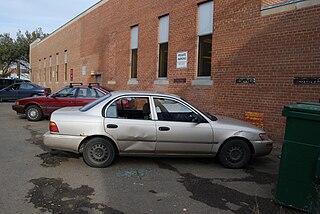
Motor vehicle theft is the criminal act of stealing or attempting to steal a motor vehicle. Nationwide in the United States in 2020, there were 810,400 vehicles reported stolen, up from 724,872 in 2019. Property losses due to motor vehicle theft in 2020 were estimated at $7.4 billion. There were 505,100 car thefts in the EU in 2019, a 43% decrease from 2008.

The Bow Street Runners were the law enforcement officers of the Bow Street Magistrates' Court in the City of Westminster. They have been called London's first professional police force. The force originally numbered six men and was founded in 1749 by magistrate Henry Fielding, who was also well known as an author. His assistant, brother, and successor as magistrate, John Fielding, moulded the constables into a professional and effective force. Bow Street Runners was the public's nickname for the officers although the officers did not use the term themselves and considered it derogatory. The group was disbanded in 1839 and its personnel merged with the Metropolitan Police, which had been formed ten years earlier.
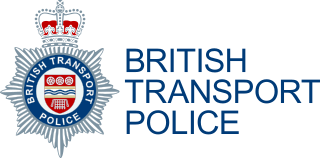
British Transport Police is a national special police force that polices the railway network of England, Wales and Scotland. The force polices more than 10,000 miles of track and more than 3,000 stations and depots.
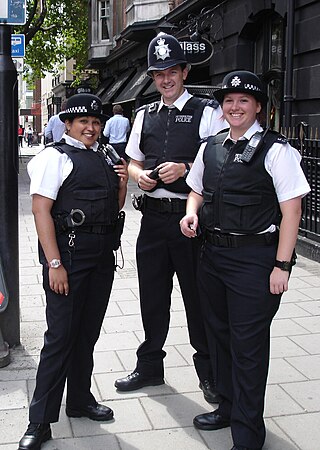
Law enforcement in the United Kingdom is organised separately in each of the legal systems of the United Kingdom: England and Wales, Scotland, and Northern Ireland. Most law enforcement duties are carried out by those who hold the office of police constable of a territorial police force.
A Police Community Support Officer, or as written in legislation Community Support Officer, is a uniformed member of police staff in England and Wales, a role created by Section 38(2) of the Police Reform Act 2002, which was given Royal Assent by Queen Elizabeth II on 24 July 2002. They are not warranted, but hold a variety of police powers and the power of a constable in various instances by the forty-three territorial police forces in England and Wales and the British Transport Police.

West Midlands Police is the territorial police force responsible for policing the metropolitan county of West Midlands in England.

Dorset Police is the territorial police force responsible for policing the county of Dorset in South West England, which includes the largely rural area covered by Dorset Council, and the urban conurbation of Bournemouth, Christchurch and Poole.
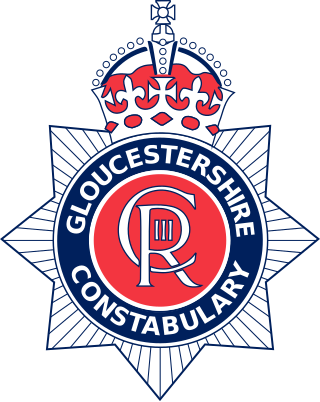
Gloucestershire Constabulary is the territorial police force responsible for policing the non-metropolitan county of Gloucestershire in South West England.
Shomrim or Shmira are organizations of proactive volunteer Jewish civilian patrols which have been set up in Haredi communities in neighborhoods across the United States, Canada and the United Kingdom to combat burglary, vandalism, mugging, assault, domestic violence, nuisance crimes and antisemitic attacks, and to help and support victims of crime. They also help locate missing people.

In English legal history, a thief-taker was a private individual hired to capture criminals. The widespread establishment of professional police in England did not occur until the 19th century. With the rising crime rate and newspapers to bring this to the attention of the public, thief-takers arose to partially fill the void in bringing criminals to justice. These were private individuals much like bounty hunters. However, thief-takers were usually hired by crime victims, while bounty hunters were paid by bail bondsmen to catch fugitives who skipped their court appearances and hence forfeited their bail. Both types also collected bounties offered by the authorities.
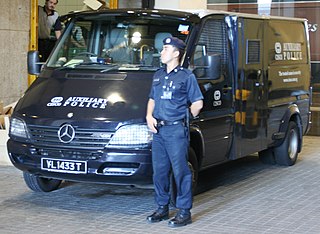
Private police or special police are types of law enforcement agencies owned and/or controlled by non-government entities. Additionally, the term can refer to an off-duty police officer while working for a private entity, providing security, or otherwise performing law enforcement-related services; officers engaging in private police work have the power to enforce the law, however, terminology and authority vary by jurisdiction.

The Metropolitan Police of Greater London, England is organised into five main directorates, each headed by an Assistant Commissioner, and four civilian-staffed support departments previously under the umbrella of Met Headquarters, each headed by a Chief Officer, the equivalent civilian grade to Assistant Commissioner. Each business groups or directorate has differing responsibilities. The commands are Frontline Policing, Met Operations, Specialist Operations and Professionalism.

The history of law enforcement in the United Kingdom charts the development of law enforcement in the United Kingdom and its predecessor states. It spans the period from the Middle Ages, through to the development of the first modern police force in the world in the nineteenth century, and the subsequent modernisation of policing in the twentieth and twenty-first centuries.

Figures on crime in London are based primarily on two sets of statistics: the Crime Survey for England and Wales (CSEW) and police recorded crime data. Greater London is generally served by three police forces; the Metropolitan Police which is responsible for policing the vast majority of the capital, the City of London Police which is responsible for The Square Mile of the City of London and the British Transport Police, which polices the national rail network and the London Underground. A fourth police force in London, the Ministry of Defence Police, do not generally become involved with policing the general public. London also has a number of small constabularies for policing parks. Within the Home Office crime statistic publications, Greater London is referred to as the London Region.

SelectaDNA is a forensic property marking system used as part of crime prevention strategies for businesses and residential properties.

South Keys is a neighbourhood in Gloucester-Southgate Ward in the south end of Ottawa, Ontario, Canada. It is bounded by Johnston Road to the north, Albion Road to the east, the Airport Parkway to the west, and Hunt Club Road to the south. According to the Canada 2011 Census, the neighbourhood has a population of 2,849. The neighbourhood is part of the South Keys Greenboro Community Association.

Bicycle theft is the crime of stealing a bicycle. It is a common crime due to the relative ease of reselling bicycles, which have a large second-hand market. This makes the crime attractive to those needing to obtain currency quickly, such as people with substance addictions. Bicycles are also easily accessible, often being locked up outside in public places in urban areas. Despite the developed market of bicycle locks, it is estimated that millions of bicycles are stolen every year. Thieves use a variety of methods to bypass locks, including taking advantage of bicycle owners' poor locking practices. Bicycle owners can take action to reduce the chances of theft, including utilising facilities such as bicycle lockers and parking racks.
References
- ↑ "My Local Bobby Limited overview - Find and update company information - GOV.UK". Companies House . 17 November 2016. Retrieved 20 February 2024.
- ↑ "Brave veteran rushes to rescue man shot in neck and chest in Woodford Green". Ilford Recorder. 17 July 2019. Retrieved 2 October 2019.
- ↑ "The growth of private policing is eroding justice for all". Guardian. 10 September 2018. Retrieved 2 October 2019.
- ↑ "Britain's first private police force to go nationwide after success in London's wealthiest neighbourhoods". Evening Standard. 6 May 2018. Retrieved 14 September 2018.
- ↑ "Scared residents hire private bobbies to walk them home". The Times. 24 November 2018. Retrieved 2 October 2019.
- ↑ "Our policing is being privatised by stealth". The Times. 11 September 2018. Retrieved 14 September 2018.
- ↑ "Private police forces threaten to take us back to the bad old days of "thief-takers"". New Statesman. 29 August 2018. Retrieved 14 September 2018.
- ↑ "London's richest neighbourhoods to get own private police force" . Independent. 7 March 2017. Archived from the original on 18 June 2022. Retrieved 2 October 2019.